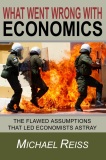I'd like to present two ideas for making improved progress in economics:
1. Build computer simulations.
In recent years computers have become comfortably fast enough so that they could run simulations of entire populations. Simulating economies could revolutionize the subject in several ways.
- The process of trying to get a simulation to show all the same patterns as a real economy would, in itself, be an enlightening experience.
- Once a working simulation has been built, new theories could be tested within it.
- The accuracy of peoples simulations would give bragging rights to the best economists rather than the economists with the most popular ideas.
I recently saw a short bio-pic about the economist Murry Rothbard in which it was stated that he was a prolific author, apparently he wrote 20 books - I immediately thought to myself - that guarantees that his work will never be properly digested. If I want to learn about his best ideas, which of his 20 books do I read? Do I have to read all of them? How about having the default format for a "paper" being an html document with hyperlinks. Encourage multiple iterations where readers give feedback about sections they found hard to understand or disagreed with. Allow the author to re-write sections, correct errors and add additional documents linked from the original to expand on points that some readers thought needed further detail or thought contentious.
I my time in academia I noticed that scientists were encouraged to write as many papers as possible. This led to a situation where if you had two closely related ideas in a field you would be encouraged to write them up in two separate papers. It also led to a situation where scientists were discouraged from making things too clear in their papers because that meant that others could too easily use your ideas to generate their own papers which may then diminish your opportunities for publishing in that field in the future. This system is a minor handicap in a field with good opportunities for experimentation where bad theories will get thrown out - but in economics its a disaster - a recipe for a never ending stream of repeated errors.
If instead, economists were rewarded for the quality of their work rather than the quantity, then perhaps the field could take a few steps forward.




No comments:
Post a Comment